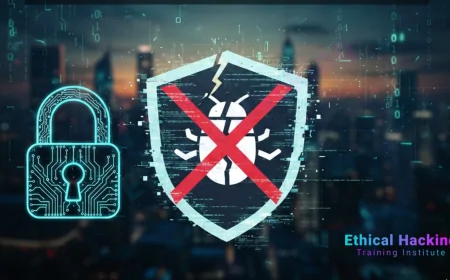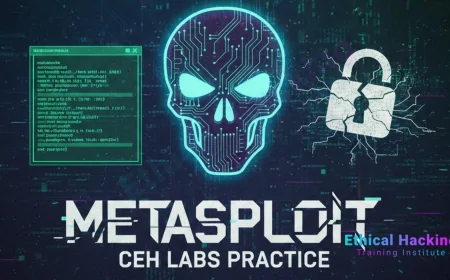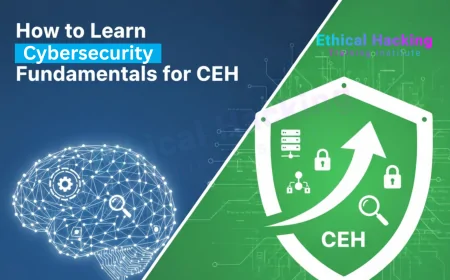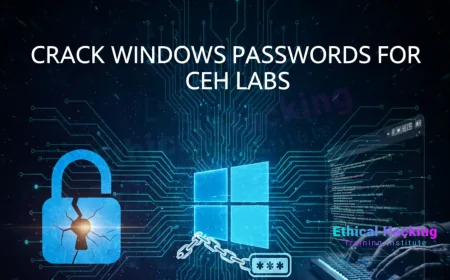CPENT Exam Cost, Eligibility & Application Guide | Certified Penetration Testing
Discover the latest details on CPENT exam cost, eligibility criteria, and how to apply. Get insights into career benefits, application steps, and training tips for aspiring penetration testers in Pune and beyond.

In the rapidly advancing field of cybersecurity, certifications act as a benchmark of skill, professionalism, and technical proficiency. One of the most prestigious and practical certifications available today is CPENT – Certified Penetration Testing Professional. Designed for experienced cybersecurity practitioners, CPENT stands as a globally recognized credential that validates advanced penetration testing skills across enterprise environments.
This blog will walk you through CPENT exam cost, eligibility, and how to apply, while highlighting essential components that make this certification unique and career-transforming. Whether you're a penetration tester, security consultant, or aspiring ethical hacker, this in-depth guide will help you navigate the path toward CPENT certification confidently.
What is CPENT?
CPENT stands for Certified Penetration Testing Professional, a hands-on, performance-based certification designed to evaluate a cybersecurity professional’s ability to perform advanced penetration testing techniques.
Unlike traditional theoretical exams, CPENT focuses on real-world offensive security skills, such as:
-
Penetration testing across internal and external networks
-
Web application exploitation
-
Cloud-based penetration testing
-
Bypassing security defenses
-
Writing custom scripts and tools
-
Exploiting IoT and operational technology systems
What makes CPENT stand out is the practical exam format — candidates are tested in a live, cyber range environment over 24 hours (divided into two 12-hour sessions), making it one of the most challenging and realistic assessments in the industry.
Why CPENT Matters in Cybersecurity Today
The demand for skilled penetration testers and red team professionals has soared in recent years. Companies now face sophisticated threats, including ransomware, advanced persistent threats (APTs), and zero-day exploits. In this climate, certifications like CPENT prove that a candidate can do more than understand theoretical concepts — they can actively defend, exploit, and assess enterprise-grade networks.
Here’s why CPENT has gained global recognition:
-
Focuses on practical, real-world hacking challenges
-
Covers modern attack surfaces, including cloud, ICS/SCADA, and Python scripting
-
Promotes advanced pivoting and lateral movement techniques
-
Offers dual certification: earn CPENT and LPT (Licensed Penetration Tester) if you score 90%+
CPENT Exam Cost: A Breakdown
One of the first questions potential candidates ask is: How much does the CPENT exam cost? While prices can vary slightly depending on the location or platform through which you register, here's a detailed cost overview:
Standard Exam Package:
-
Exam Voucher: $999 (USD)
-
Includes 1 attempt at the CPENT exam (24 hours in two sessions)
-
Access to a dedicated cyber range environment
Training + Exam Bundles (Optional):
-
Some candidates choose to prepare using official training kits or hands-on labs.
-
Bundled packages may range from $1,999 to $2,499, including:
-
iLabs cyber range access (6 months)
-
E-courseware or instructor-led training (live or on-demand)
-
1 CPENT exam voucher
-
Retake Options:
-
A second attempt may be included in select bundles, or available for an additional fee ($499+ depending on the provider)
Cost-Saving Tip:
-
Some providers offer discounts, early-bird pricing, or vouchers for professionals with prior certifications like CEH or ECSA.
Note: Prices are listed in USD. Local currency and tax implications may apply based on region.
CPENT Exam Eligibility Criteria
One of the best aspects of the CPENT certification is its open eligibility model—there are no mandatory prerequisites. However, the nature of the exam demands a strong background in cybersecurity, especially in penetration testing.
Here’s what you should ideally have before attempting CPENT:
Recommended Prerequisites:
-
At least 2-3 years of hands-on experience in penetration testing, red teaming, or ethical hacking
-
Strong understanding of:
-
TCP/IP networking
-
Operating systems (Windows, Linux)
-
Programming/scripting (Python, Bash, PowerShell)
-
Web and network vulnerabilities
-
Reconnaissance and exploit development
-
-
Familiarity with tools such as Nmap, Metasploit, Burp Suite, Wireshark, John the Ripper, etc.
Helpful Prior Certifications:
While not required, many CPENT aspirants hold prior certifications like:
-
CEH (Certified Ethical Hacker)
-
ECSA (EC-Council Certified Security Analyst)
-
OSCP (Offensive Security Certified Professional)
Who Should Take the CPENT Exam?
The CPENT certification is suitable for advanced-level professionals who work in, or aim to work in, the following roles:
-
Penetration Tester
-
Ethical Hacker
-
Cybersecurity Analyst
-
Red Team Operator
-
Security Consultant
-
Network Security Engineer
-
Information Security Specialist
This certification also appeals to military personnel, law enforcement agents, and IT professionals engaged in cyber offense or digital forensics.
How to Apply for the CPENT Exam: Step-by-Step Guide
Applying for the CPENT exam is straightforward. Here’s a breakdown of the application and registration process:
Step 1: Prepare for the Exam
-
Evaluate your current skill level in offensive security.
-
Decide if you’ll prepare through self-study or enroll in a structured training program.
-
Gain hands-on practice through simulated labs or live cyber ranges.
Step 2: Purchase the CPENT Exam Voucher
-
Visit the official certification portal or an authorized training partner.
-
Choose your preferred exam package (standalone voucher or bundle).
-
Complete the payment process.
-
You’ll receive an email with access credentials, login information, and exam instructions.
Step 3: Schedule the Exam
-
CPENT is a proctored online exam, taken in a live environment over 24 hours (in two 12-hour sessions).
-
Once ready, schedule your exam slot based on available dates.
-
Make sure your system meets the hardware and internet requirements for the proctored setup.
Step 4: Take the Exam
-
On exam day, log in at the scheduled time.
-
The exam environment includes real-world challenges that simulate enterprise networks.
-
Submit reports within the stipulated time frame.
Step 5: Get Certified
-
Scores are usually released within a few weeks.
-
Based on your score:
-
70%+ earns the CPENT certification
-
90%+ earns both CPENT and the prestigious LPT (Master) certification
-
What to Expect in the CPENT Exam?
The CPENT exam is not theoretical. It tests practical, real-time penetration testing ability across various attack surfaces. Key features include:
Live Cyber Range Testing
-
No multiple-choice questions.
-
You’ll face real-time penetration testing tasks like gaining access, escalating privileges, and exfiltrating data.
Tactical Domains Covered
-
Advanced network scanning and pivoting
-
Exploitation of Linux and Windows systems
-
Privilege escalation and evasion techniques
-
Active Directory attacks
-
Web application exploitation (OWASP Top 10)
-
Binary exploitation and reverse engineering
-
IoT and ICS attacks
-
Cloud and container security testing
Reporting and Documentation
-
Candidates must generate professional penetration test reports as part of the exam.
-
This simulates real-world deliverables expected from professional testers.
CPENT Exam Grading and Result
After completing the exam and submitting your reports, expect the following grading process:
-
Evaluation is done by expert examiners.
-
Results include pass/fail, a percentage score, and certification recommendations.
-
Turnaround time for results is typically 7 to 14 days.
-
Digital certification and badge are provided upon passing.
Tips to Prepare for the CPENT Exam
Focus on Hands-On Labs
Theory is not enough. Get as much lab-based practice as possible.
Master Tools and Scripting
Be fluent in Python, Bash, and PowerShell. Know tools like:
-
Metasploit
-
Nmap
-
Burp Suite
-
Empire
-
BloodHound
-
Wireshark
Build a Hacking Lab
Set up your own testing lab using VirtualBox or VMware with vulnerable VMs.
Study Advanced Topics
Pay special attention to:
-
Exploiting misconfigured services
-
Writing custom exploits
-
Active Directory enumeration and attacks
-
Docker and Kubernetes penetration testing
CPENT vs Other Certifications: A Quick Comparison
| Feature | CPENT | OSCP | CEH |
|---|---|---|---|
| Format | Hands-on, 24-hour exam | Hands-on, 24-hour exam | MCQ-based (theory) |
| Difficulty | Advanced | Intermediate-Advanced | Beginner-Intermediate |
| Coverage | Cloud, IoT, AD, custom exploits | OS-level & network | Concepts and tools |
| Report Submission | Yes | Yes | No |
| Real-World Simulation | Yes | Yes | Limited |
How Long Should You Prepare?
Depending on your background, here’s a rough preparation timeline:
| Background | Suggested Study Time |
|---|---|
| Beginner in Pen Testing | 6–8 months |
| Intermediate (CEH/ECSA holders) | 3–5 months |
| Advanced (Hands-on professionals) | 1–3 months |
Consistency and hands-on practice are key to clearing CPENT on the first attempt.
CPENT Certification Validity and Renewal
-
Validity: CPENT certification is valid for 3 years from the date of issue.
-
Renewal: Can be renewed by:
-
Earning Continuing Education (CPE) credits
-
Attending advanced training
-
Retaking the CPENT exam
-
Career Benefits of CPENT Certification
Earning the CPENT credential provides a powerful boost to your cybersecurity career:
Career Growth:
-
Opens doors to senior penetration testing and red team roles
-
Qualifies you for positions in government, defense, and critical infrastructure
Salary Uplift:
-
Certified professionals report an average salary increase of 25–35%
-
CPENT holders often command six-figure salaries globally
Global Recognition:
-
CPENT is recognized by major organizations and government bodies
-
Often used as a hiring benchmark for red team roles
FAQ's
What is the CPENT certification exam?
The CPENT (Certified Penetration Testing Professional) exam is a hands-on, performance-based ethical hacking certification that evaluates your ability to conduct advanced penetration tests in real-world enterprise environments. It is ideal for professionals aiming for high-level cybersecurity roles in red teaming or ethical hacking.
How much does the CPENT exam cost?
The standalone CPENT exam voucher typically costs around $999 USD. If you opt for a bundle that includes training and lab access, prices can range from $1,999 to $2,499 USD depending on the training provider and package features.
Are there any prerequisites to take the CPENT exam?
There are no formal prerequisites, but prior experience in penetration testing or holding certifications like CEH or ECSA is strongly recommended. Candidates should be proficient in ethical hacking tools, scripting, and real-world cybersecurity practices.
Is CPENT suitable for beginners in ethical hacking?
CPENT is not ideal for complete beginners. It is an advanced-level certification best suited for professionals with prior penetration testing experience or those who have already earned certifications like CEH. Beginners should first build foundational skills before attempting CPENT.
How long does it take to prepare for CPENT?
Preparation time depends on your experience. Beginners may need 6–8 months, while intermediate professionals can prepare in 3–5 months. Daily hands-on lab practice, scripting, and vulnerability exploitation are essential to passing the exam successfully.
What is the format of the CPENT exam?
The CPENT exam is a 24-hour hands-on test, usually divided into two 12-hour sessions. It involves solving real-world penetration testing challenges in a live cyber range. You’ll need to demonstrate advanced skills in reporting, exploitation, and network compromise.
Can I take the CPENT exam online?
Yes, the CPENT exam is conducted online through a proctored environment. You will access a dedicated cyber range where you complete tasks remotely. A stable internet connection and system compatibility are required for the test.
What topics are covered in the CPENT course?
CPENT covers advanced ethical hacking topics such as internal and external network testing, IoT and OT exploitation, cloud penetration testing, pivoting, scripting in Python and PowerShell, Active Directory attacks, and advanced reporting.
Does CPENT offer a dual certification benefit?
Yes, candidates who score 90% or higher in the CPENT exam are awarded the prestigious LPT (Master) credential in addition to CPENT. This dual recognition enhances professional credibility and employment prospects in ethical hacking and red teaming.
How is CPENT different from CEH or OSCP?
While CEH is theory-based and entry-level, CPENT is an advanced, practical exam. Compared to OSCP, CPENT covers a broader attack surface including cloud, IoT, and AD exploitation. It focuses heavily on enterprise-level penetration testing skills and professional reporting.
What are the career benefits of passing CPENT?
CPENT certification can lead to advanced cybersecurity roles such as penetration tester, red team lead, or security analyst. Certified professionals often receive higher salaries, better job security, and greater trust from employers handling critical security tasks.
How do I register for the CPENT exam in Pune?
You can register through the official certification website or via authorized training centers in Pune. Purchase an exam voucher, schedule your exam date, and receive access credentials. Training institutes also offer bundles with exam vouchers and lab access.
Is CPENT certification recognized globally?
Yes, CPENT is globally recognized by cybersecurity professionals, government agencies, and top tech firms. It validates your ability to perform advanced penetration tests across various platforms, which makes it highly valued across industries worldwide.
Can I retake the CPENT exam if I fail?
Yes, you can retake the CPENT exam. Some packages offer a free retake, while others may charge an additional fee (typically around $499 USD). It's advisable to use the feedback from your first attempt to better prepare for the retake.
Do I receive a digital certificate after passing CPENT?
Yes, upon passing the exam, you receive a digital certificate and badge. These can be used on LinkedIn, resumes, and job applications to demonstrate your skills and certification status to potential employers.
What roles can I apply for after CPENT certification?
CPENT-certified professionals can apply for roles such as Penetration Tester, Red Team Expert, Security Analyst, Ethical Hacker, or Network Security Consultant. These roles exist across finance, defense, healthcare, and IT services sectors.
How does CPENT help in real-world penetration testing jobs?
The CPENT exam simulates real-life enterprise scenarios, which improves your practical skills in identifying vulnerabilities, exploiting systems, and generating professional reports. These are directly applicable in real-world penetration testing projects and client engagements.
Is CPENT valid for government or defense jobs in India?
Yes, CPENT is often accepted for cybersecurity roles in government, defense, and public sector organizations. Its practical assessment model aligns well with the high-level testing standards required by such agencies.
Does CPENT certification expire?
Yes, CPENT certification is valid for three years. You can renew it by earning Continuing Professional Education (CPE) credits or retaking the exam. Staying updated with cybersecurity trends is essential for maintaining certification relevance.
Is hands-on lab access available with CPENT training?
Yes, most CPENT training programs offer access to iLabs or similar virtual environments. These labs simulate real networks and allow you to practice exploitation, reporting, and tool usage before attempting the certification exam.
Is CPENT Right for You?
If you're serious about building an elite career in offensive cybersecurity and have the discipline to train rigorously, CPENT is absolutely worth it. It’s more than just a certificate — it’s a practical validation of your real-world capabilities in one of the most respected cybersecurity domains.
With no unnecessary fluff, the CPENT exam demands your best — but in return, it delivers recognition, credibility, and high-impact career opportunities.
What's Your Reaction?
 Like
0
Like
0
 Dislike
0
Dislike
0
 Love
0
Love
0
 Funny
0
Funny
0
 Angry
0
Angry
0
 Sad
0
Sad
0
 Wow
0
Wow
0



















